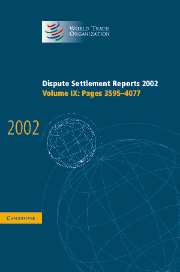Book contents
- Frontmatter
- Contents
- United States – Preliminary Determinations with Respect to Certain Softwood Lumber from Canada (WT/DS236/R): Report of the Panel
- United States – Countervailing Duties on Certain Corrosion- Resistant Carbon Steel Flat Products from Germany (WT/DS213/AB/R, WT/DS213/R): Report of the Appellate Body
- United States – Countervailing Duties on Certain Corrosion- Resistant Carbon Steel Flat Products from Germany (WT/DS213/AB/R, WT/DS213/R): Report of the Panel
- Cumulative Index of Published Disputes
United States – Countervailing Duties on Certain Corrosion- Resistant Carbon Steel Flat Products from Germany (WT/DS213/AB/R, WT/DS213/R): Report of the Appellate Body
Published online by Cambridge University Press: 13 December 2017
- Frontmatter
- Contents
- United States – Preliminary Determinations with Respect to Certain Softwood Lumber from Canada (WT/DS236/R): Report of the Panel
- United States – Countervailing Duties on Certain Corrosion- Resistant Carbon Steel Flat Products from Germany (WT/DS213/AB/R, WT/DS213/R): Report of the Appellate Body
- United States – Countervailing Duties on Certain Corrosion- Resistant Carbon Steel Flat Products from Germany (WT/DS213/AB/R, WT/DS213/R): Report of the Panel
- Cumulative Index of Published Disputes
Summary
INTRODUCTION
The United States and the European Communities each appeal certain issues of law and legal interpretations in the Panel Report, United States – Countervailing Duties on Certain Corrosion-Resistant Carbon Steel Flat Products from Germany (the “Panel Report”). The Panel was established to consider a complaint by the European Communities against the United States regarding the continuation of countervailing duties on certain corrosion-resistant carbon steel flat products from Germany (“carbon steel”) following the conduct of a five-year, or “sunset”, review of those duties.
On 17 August 1993, the United States imposed definitive countervailing duties on carbon steel. The imposition of the duties was based on an investigation by the United States Department of Commerce (“USDOC”) in which it determined that certain German producers of carbon steel benefitted, at a total rate of 0.60 percent ad valorem, from five countervailable subsidy programs. On 1 September 1999, USDOC gave notice of the automatic initiation of a sunset review of these countervailing duties. In the course of this review, USDOC determined that revocation of the countervailing duties “would be likely to lead to continuation or recurrence of a countervailable subsidy” with respect to carbon steel and transmitted this determination to the United States International Trade Commission (“USITC”). Based on its finding that two of the original five subsidy programs had been terminated, the likely rate of such continuation or recurrence of a countervailable subsidy was determined by USDOC to be 0.54 percent ad valorem. Following an affirmative determination of the likelihood of continuation or recurrence of injury by USITC, USDOC published a notice of the continuation of the countervailing duties on 15 December 2000.
The European Communities argued before the Panel that United States law relating to sunset reviews, as such, and as applied in the sunset review of countervailing duties on carbon steel in this case, was inconsistent with United States’ obligations under the Agreement on Subsidies and Countervailing Measures (the “SCM Agreement”). The European Communities argued that the United States acted contrary to Article 21.3 of the SCM Agreement by automatically self-initiating sunset reviews and by failing to apply in sunset reviews the de minimis standard of 1 percent set out in Article 11.9 of that Agreement.
- Type
- Chapter
- Information
- Dispute Settlement Reports 2002 , pp. 3779 - 3832Publisher: Cambridge University PressPrint publication year: 2005
- 2
- Cited by



